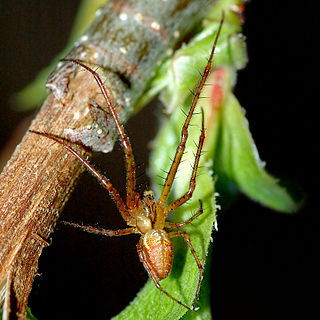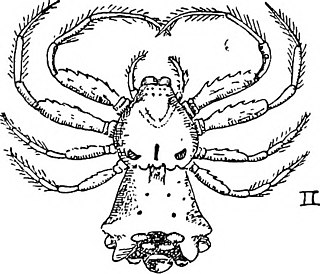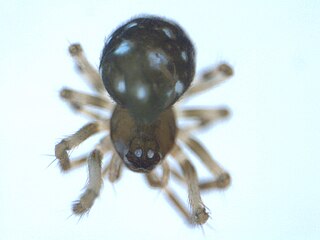
Long-jawed orb weavers or long jawed spiders (Tetragnathidae) is a family of araneomorph spiders first described by Anton Menge in 1866. They have elongated bodies, legs, and chelicerae, and build small orb webs with an open hub with few, wide-set radii and spirals with no signal line or retreat. Some species are often found in long vegetation near water.

Barychelidae, also known as brushed trapdoor spiders, is a spider family with about 300 species in 42 genera. Most spiders in this family build trapdoor burrows. For example, the 20 millimetres (0.79 in) long Sipalolasma builds its burrow in rotted wood, with a hinged trapdoor at each end. The 10 millimetres (0.39 in) long Idioctis builds its burrow approximately 5 centimetres (2.0 in) deep, just below the high tide level, sealing the opening with a thin trapdoor.

Stenochilidae is a family of southeast Asian araneomorph spiders that produce ecribellate silk. First described by Tamerlan Thorell in 1873, it now contains twelve described species in two genera.

Mysmenidae is a spider family with about 135 described species in thirteen genera. The family is one of the least well known of the orb-weaving spiders because of their small size and cryptic behaviour. These spiders are found in humid habitats such as among leaf litter and in caves.

Poecilotheria is a genus of Asian tarantulas that was first described by Eugène Louis Simon in 1885. They are arboreal tarantulas, commonly known as ornamental tarantulas, known for their vivid color patterns, fast movement, and potent venom compared to other tarantulas. As of 2019 all species are protected under CITES.
Chorizopes is a genus of orb-weaver spiders first described by O. Pickard-Cambridge in 1871. Though it belongs to the orb weaver family, these spiders move through leaf litter preying on other spiders rather than spinning webs. The original name was "Chorizoopes", but the emendation Chorizopes by Tamerlan Thorell is now protected by usage.

Dolichognatha is a genus of tropical and subtropical long-jawed orb-weavers that was first described by Octavius Pickard-Cambridge in 1869. Originally placed with the Archaeidae, it was transferred to the Araneidae in 1967, and to the Tetragnathidae in 1981.
Ursa is a genus of orb-weaver spiders first described by Eugène Simon in 1895.
Chorizopes mucronatus is a species of spider of the genus Chorizopes. It is known only from Sri Lanka.
Hypsosinga taprobanica, is a species of spider of the genus Hypsosinga. It is endemic to Sri Lanka.
Mangora semiargentea, is a species of spider of the genus Mangora. It is endemic to Sri Lanka.

Phrynarachne is a genus of crab spiders first described by Tamerlan Thorell in 1869.
Ursa vittigera, is a species of spider of the genus Ursa. It is endemic to Sri Lanka.
Andasta semiargentea, is a species of spider of the genus Andasta. It is endemic to Sri Lanka.
Microdipoena saltuensis, is a species of spider of the genus Microdipoena. It is endemic to Sri Lanka.

Microdipoena is a cosmopolitan genus of dwarf cobweb weaver spiders in the family Mysmenidae, containing sixteen species. Four new species were discovered from 2003 and 2013.
Phricotelus stelliger is a species of spider of the monotypic genus Phricotelus. It is endemic to Sri Lanka.

Coscinida is a genus of comb-footed spiders that was first described by Eugène Louis Simon in 1895.
Tagulis is a genus of crab spiders in the family Thomisidae, containing only two species.
Tarrocanus is a genus of crab spiders in the family Thomisidae, containing only two species.








